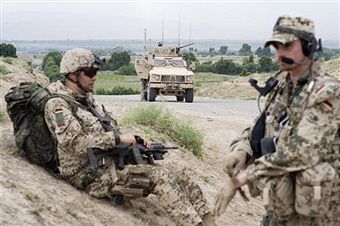 In opposition, the Conservatives pursued an AfPak policy that can best be described as
loyal criticism – while they supported the mission they criticised the means and methods employed to achieve it. It was an effective line of attack.
In opposition, the Conservatives pursued an AfPak policy that can best be described as
loyal criticism – while they supported the mission they criticised the means and methods employed to achieve it. It was an effective line of attack.
But now that they have the internal documents and can call for further intelligence assessments, they should instead undertake a zero-based review of the current strategy focusing on: 1) the viability of the current US approach; 2) the likely timing and manner of a US shift; and 3) the best role for the UK in the next six months, in the next 2 years and in the next five years. In this discussion nothing – absolutely nothing – must be off the table.
If Labour spent too much of their early years fighting the Civil Service, the Conservatives are likely to trust their officials too readily. The extent to which the National Security Council staff – a still emerging body – can undertake a genuinely dogma-challenging review is unclear. Either way, David Cameron would do well to commission a secret review of the mission by an external team, which can be read alongside the official advice.
From what I have seen – and reading Mary Wakefield’s piece in the magazine confirms my view – a no-holds-barred assessment would probably conclude the current international strategy – a combination of stabilisation, military advances and state-building – is failing. That more of the same – more money, more soldiers, more conferences will make little difference. It will probably also conclude that the central state has become so hollowed out – it maintains the edifices of governance although most are heavily corrupted and controlled by a tribally-based elite around the Karzai family – that it cannot deliver any services; quite the opposite, its presence outside of Kabul is so predatory and exclusionary that it encourages resistance from anyone but the president’s tribe.
The assessment will likely predict that the forthcoming parliamentary elections will be as fraudulent as last year’s presidential elections – because President Hamid Karzai either intends to stand for a constitution-defying third term or have a proxy elected and in either case he needs a pliant legislature. Finally the assessment will probably predict that the US president is likely to want to begin a precipitous military withdrawal in 2011.
This all points to a gradual withdrawal. But any assessment will probably also conclude that a victory for the Taliban will have serious consequences for UK security – boosting the morale of jihadis everywhere – and that the US will be resentful if the UK pulls its troops out before the US does. Defence cuts will produce considerable in-fighting in the Ministry of Defence; if Helmand is added to the pantheon of British defeats alongside Basra, things might get worse.
So what to do? The Cameron-Clegg government should consider a conditions-based re-adjustment of forces. The UK condition for continued engagement – put to both the US and Afghan governments – should be the beginning of a political process that brings a new settlement, which builds on the 2001 Bonn agreement, but addresses its failures and omissions. Such a settlement must broaden the tent to include those sidelined in Bonn and outline the next stages of a more inclusive and sustainable political process. Benchmarks for progress towards such a settlement should be enunciated privately to President Karzai, so that the obfuscation and obstruction of the previous years can be avoided.
Contingent on this, the UK should look to shift its forces to Kandahar in the next six months, with a two-year horizon, then moving to a theatre-wide remit so they can be used where needed. This should be in preparation in four years’ time for a withdrawal of the majority of forces, with UK Special Forces and Operational Mentoring and Liaison Teams (who train the local forces) staying behind. On the civilian side, the next couple of years should focus less on distributing money and providing technical capacity and more on understanding the political situation better so as to help a settlement get under way – policemen should be replaced by political analysts.
If the British government wants “a solid but unslavish” US policy and find a way out of the NATO mission that does not create a security problem or damage the alliance, it should order an independent assessment of the current mission and consider the kind of hardnosed strategy proposed here.






Comments